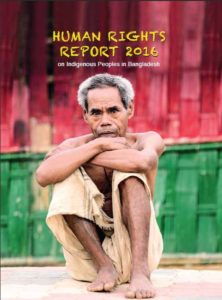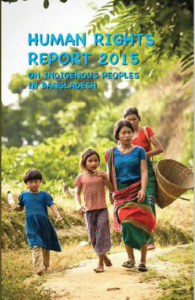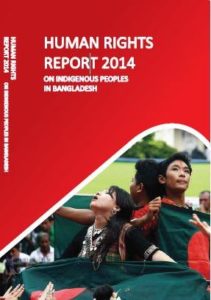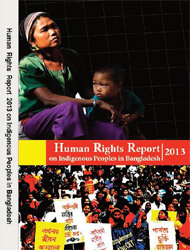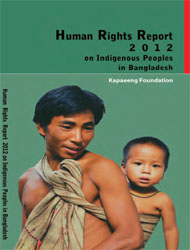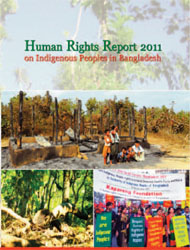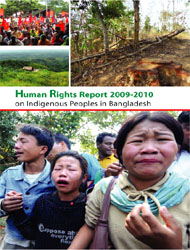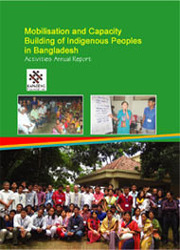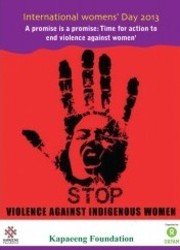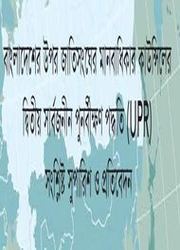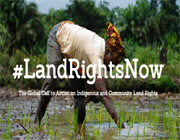IPOs form mass human chain throughout the country including 300 km in CHT demanding full implementation of CHT Accord and formation of independent Land Commission for indigenous peoples of plain lands

KF Report: On 18 January 2016 from 10:00 am to 11:00 am, Indigenous Peoples Organisations (IPOs) in Bangladesh formed mass human chain in 27 districts throughout the country including a 300 kilometre-long in three hill districts of Chittagong Hill Tracts (CHT) demanding for proper, speedy and fullest implementation of the CHT Accord, signed between the government of Bangladesh and indigenous Jumma peoples in CHT 18 years ago, and formation of an independent Land Commission for restitution of alienated land of indigenous peoples of plain land as pledged by the Awami League-led present Grand Alliance government in its election manifestos in 2008 and 2014.
In CHT, spanning the 300 kilometer distance from Dudukchara under Panchari upazila in Khagrachari district to Gundhum under Naikhyongchari upazila in Bandarban district, the protest was organised by the Chittagong Hill Tracts Citizens Committee, the Bangladesh Indigenous Peoples Forum (CHT Chapter) and the CHT Headmen’s Network with the participation of several community-based organisations including youths, students, women, cultural and human rights organisations holding banners, placards and festoons.
Among others, Jyotirindra Bodhipriya Larma, Chairman of CHT Regional Council and President of PCJSS, attended the human chain at Kalyanpur in Rangamati town and Barrister Raja Devasish Roy, Circle Chief of Chakma Circle and expert member of the UN Permanent Forum of Indigenous Issues, participated in the human chain in Longadu under Rangamati district. Chittagong Hill Tracts Citizens Committee President Goutam Dewan, Bangladesh Adivasi Forum district unit President Prokriti Ranjan Chakma and Vice President Bijoy Keton Chakma, eminent educationist and former chairman of Rangamati Hill District Council Dr. Manik Lal Dewan and member of National Human Rights Commission Nirupa Dewan and other leaders of the organisations addressed the human chain in front of Deputy Commission’s office in Rangamati. Indigenous Peoples Organizations in Bandarban also formed human chian in different points accross the district on the same day and demanded for speedy implementation of the CHT Accord and establishment of separate Land Commission for the plains.
However, residents of Khagrachari district formed human chain amid obstruction of administration, police and security forces. Though district administration of Rangamati and Bandarban allowed to form human chain and provided necessary supports, but the police and security forces barred the Jumma people to form the human chain at places in the town and elsewhere in Khagrachari district. At Mahajan Para and Chengi Square of Khagrachari town, police did not allow the people to stand and snatched away their banner. In a press release signed by president of CHT Citizen’s Committee Goutam Dewan alleged that security forces allegedly beat up nine people when they tried to stand supporting the mass human chain at Maischari under Mahalchari upazila on Rangamati-Khagrachari road. The police also did not allow the people to stand and snatched away their banner at Mahalchari upazila sadar. Following the obstruction of administration and law enforcement agencies, the leaders of CHT Citizens Committee, BIPF and CHT Headmen’s Network repeatedly organisaed a press conference at Khagrachari town and condemned the law enforcers and security forces’ attack on such a non-violent programme.
Meanwhile, several indigenous peoples’ organisations and rights groups in facilitation of BIPF, Kapaeeng Foundation and Jatiya Adivasi Parishad formed human chain in front of the National Museum in Dhaka. President of Oikya NAP Pankaj Bhattacharya, Dhaka University professor Mesbah Kamal, general secretary of BIPF Sanjeeb Drong, central committee member of Communist Party of Bangladesh Ruhin Hossain Prince, human rights activist Dipayon Khisa, executive director of Kapaeeng Foundation Pallab Chakma, coordinator of Jana Uddyog Tarek Mithul, joint convenor of Bangladesh Indigenous Women Network Chaitali Tripura, member of national committee of BIPF Dr. Gojendra Mahato and Ripon Chandra Banai were present at a human chain.
Throughout the country, around 30 IPOs simultaneously formed an hour long human chain at least in 18 districts other than three hill districts of CHT. The districts in plain lands include Chittagong, Cox’s Bazar, Rajshahi, Sylhet, Rangpur, Sirajganj, Natore, Satkhira, Tangail, Naogaon, Dinajpur, Thakurgaon, Joypurhat, Gaibandha, Chapainawabganj, Mymensingh, Netrokona, Moulvibazar, Barguna etc.
It is unfortunate to mention that the government had failed to implement the fundamental aspects of the CHT Accord, including forming functional CHT Land Dispute Resolution Commission, devolution of power and function to the CHT Regional Council and three Hill District Councils, demilitarised the region, proper rehabilitation of India repatriated Jumma refugees and internally displaced persons nearly two decades after the landmark deal was signed.
On the other, the government is yet to form a Land Commission for plain land indigenous peoples despite its assurance in its election manifesto – “Special measures will be taken to secure their original ownership on land, water bodies, and their age-old rights on forest areas. In addition, a land commission will be formed.” However, the mentioned promises of the present government for indigenous peoples remain mostly unfulfilled. As a result indigenous peoples across the country are facing different types of vulnerabilities, such as landlessness, limited participation in the political and administrative affairs, forced eviction, human rights violation, discrimination etc. To raise all these vulnerabilities the IPOs observed the mass human chain program across the country.
Published on January 20, 2016.



